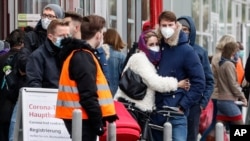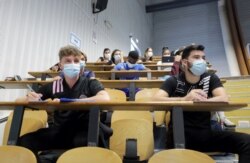German Chancellor Angela Merkel has been urging Germany’s young people to observe tightening pandemic restrictions. “Do without a few parties,” she has told them.
Once seen as a model to follow in the fight against the coronavirus, Germany is now struggling to contain the pandemic and is seeing an alarming surge in cases. Merkel Sunday night in her weekly podcast pleaded with Germans to slow the transmission of the coronavirus by “temporarily renouncing” social life outside the immediate family and home.
On Sunday, the country recorded 7,830 new cases of infection. Merkel has been struggling to persuade regional governments to impose new lockdown measures. “The pandemic is spreading rapidly again, faster than at the beginning more than six months ago,” she warned.
“The comparatively relaxed summer is over, now we are facing difficult months. How winter will be, how our Christmas will be, will be decided in the coming days and weeks. We all decide that through our actions,” she added.
Much of the federal government’s concern centers on the young. The old and frail have been heeding the warnings, remain cautious and shield at home, say officials. But for weeks federal officials have been urging youngsters to observe social-distancing rules and to wear masks.
And to stop partying.
In July and August when the worry was over, young Germans were partying abroad in resort towns in Portugal, Spain and Bulgaria. More recently the focus has turned to youngsters gathering in homes and outdoors to drink and socialize. Nightclubs have been closed for months in most cities. But bars and restaurants have often been full, and parks and forests have been venues for improvised raves.
Youngsters say they are healthy and are being made scapegoats for the spread.
Youth revolt
Youth frustration with restrictions is simmering and indifference to coronavirus safety rules is amounting in some parts of Europe to an undeclared youth revolt, fume officials.
Last Friday, an electronic dance music event held in Finland’s capital Helsinki drew the ire of politicians and doctors alike. Hundreds of closely packed youngsters partied without maintaining recommended safe distances — very few bothered to wear masks. Helsinki’s deputy mayor, Nasima Razmyar dubbed the behavior as “outrageous and irresponsible.”
“The people paying the bill [for this] will be those who follow the rules,” she tweeted, adding, “We will shut down establishments if needed,” she added.
Social Democratic Party lawmaker, Aki Linden, who is also a physician, uploaded to Twitter a video of the rave, dubbing it “irresponsible.” “If the epidemic spreads, responsible businesses, restaurants and the entire society will suffer,” he warned.
The pandemic is underscoring generational tensions in Europe, which is only likely to worsen as countries struggle to come up with ways to exist alongside the lethal virus for many months to come, say analysts. The young chaff at coronavirus restrictions and government appeals for cross-generational solidarity sometimes are facing a headwind of rebelliousness.
Last week, English youngsters held improvised street parties in the northwest of the country ahead of new partial lockdown rules, chanting “bring on herd immunity.” One of the biggest was in Liverpool just hours before the city entered the most severe tier of local lockdown. In some footage posted on social-media sites youngsters could be seen hugging each other and jumping around as police moved in, urging youthful revelers to disperse.
“While we understand how the new rules are frustrating for some, we would continue to advise everyone to abide by them, including keeping the social distancing for the safety of everyone,” said police chief superintendent Peter Costello.
And there have been mounting fears about improvised and pre-planned late-night raves at student residence halls. Across Britain, university cities have seen large case flare-ups since students arrived for classes last month. Cases numbers at more than a hundred universities have jumped. More than a thousand University of Manchester students have tested positive and 800 at the University of Newcastle.
In France, too, universities are being identified as drivers of the current wave of cases. Universities and schools now make up 32% of all major case clusters, according to French public health officials.
Across the continent more young people are testing positive. In Germany, the average age of those who are newly getting infected is now 32; in April the average age was 52. The European Center for Disease Prevention and Control says people aged 15 to 49 currently make up about 80% of those testing positive for the coronavirus compared to 50% during the first wave of the pandemic earlier this year.
Tightening restrictions
Governments are moving now to try to rejig their strategies to contain the virus, focusing their efforts on curbing nightlife. Germany, Spain, France and Italy have all announced in the past few days tighter restrictions on bars and clubs. Some countries have banned the consumption of alcohol outdoors in a bid to prevent street gatherings.
Curfews have also been imposed in France and Belgium, where all bars and restaurants will also be closed for the next four weeks. The new Belgian prime minister, Alexander De Croo, said Friday the situation facing the country is “more serious” than it was in March before a nationwide lockdown was imposed. Belgium officials say social contacts in the hospitality sector have been fueling the crisis.
In Italy, too, new restrictions announced this week will empower mayors to close down public areas after 9 p.m. if they fear they are becoming crowded. Bars and restaurants are now to close at midnight and after 6 p.m. only table service will be allowed with no one allowed to drink while standing.
Prime Minister Giuseppe Conte told Italians Sunday in a nationwide address: “We cannot waste time, we must put in place measures to avoid a generalized lockdown, which could severely compromise the economy. The government is here but everyone has to do their part.”








